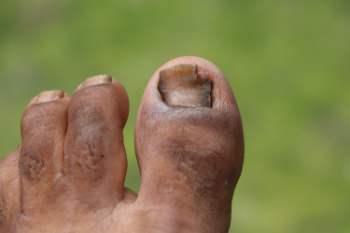
Podiatric biomechanics is the study of how the structure and function of the feet affect movement. It looks at how bones, muscles, tendons, and joints all work together to support walking, standing, and balance. When one part of the foot is misaligned or not working correctly, it can affect the way a person moves, leading to discomfort or inefficiency. Certain gait issues, such as overpronation or limping, are often tied to poor foot function. These problems may place extra stress on the ankles, knees, hips, or back. By understanding the mechanics of walking and how the feet interact with the ground, podiatrists can identify the root of dysfunction. Treatment may include custom orthotics, targeted exercises, or footwear changes. If your walking pattern feels off or you have recurring pain when moving, it is suggested that you meet with a podiatrist to explore possible causes and solutions.
If you have any concerns about your feet, contact the podiatrists from New England Family Foot Care. Our doctors can provide the care you need to keep you pain-free and on your feet.
Biomechanics in Podiatry
Podiatric biomechanics is a particular sector of specialty podiatry with licensed practitioners who are trained to diagnose and treat conditions affecting the foot, ankle and lower leg. Biomechanics deals with the forces that act against the body, causing an interference with the biological structures. It focuses on the movement of the ankle, the foot and the forces that interact with them.
A History of Biomechanics
- Biomechanics dates back to the BC era in Egypt where evidence of professional foot care has been recorded.
- In 1974, biomechanics gained a higher profile from the studies of Merton Root, who claimed that by changing or controlling the forces between the ankle and the foot, corrections or conditions could be implemented to gain strength and coordination in the area.
Modern technological improvements are based on past theories and therapeutic processes that provide a better understanding of podiatric concepts for biomechanics. Computers can provide accurate information about the forces and patterns of the feet and lower legs.
Understanding biomechanics of the feet can help improve and eliminate pain, stopping further stress to the foot.
If you have any questions please feel free to contact our office located in Milton, MA . We offer the newest diagnostic and treatment technologies for all your foot and ankle needs.

Heel pain can result from plantar fasciitis, bursitis, or Achilles tendonitis. Plantar fasciitis involves inflammation of the tissue along the bottom of the foot, often causing sharp pain with the first steps in the morning. Bursitis is inflammation of the fluid-filled sacs that cushion the heel, while tendonitis affects the Achilles tendon at the back of the heel. Symptoms include stabbing or aching pain, swelling, or stiffness, especially after periods of rest or activity. The heel may feel tender to the touch or become red and warm. A podiatrist can diagnose the cause of heel pain through a physical exam, patient history, and imaging if needed. Treatment may include supportive footwear, custom orthotics, stretching exercises, or anti-inflammatory medications. If you are dealing with heel pain, it is suggested that you make an appointment with a podiatrist for evaluation and treatment.
Many people suffer from bouts of heel pain. For more information, contact the podiatrists of New England Family Foot Care. Our doctors can provide the care you need to keep you pain-free and on your feet.
Causes of Heel Pain
Heel pain is often associated with plantar fasciitis. The plantar fascia is a band of tissues that extends along the bottom of the foot. A rip or tear in this ligament can cause inflammation of the tissue.
Achilles tendonitis is another cause of heel pain. Inflammation of the Achilles tendon will cause pain from fractures and muscle tearing. Lack of flexibility is also another symptom.
Heel spurs are another cause of pain. When the tissues of the plantar fascia undergo a great deal of stress, it can lead to ligament separation from the heel bone, causing heel spurs.
Why Might Heel Pain Occur?
- Wearing ill-fitting shoes
- Wearing non-supportive shoes
- Weight change
- Excessive running
Treatments
Heel pain should be treated as soon as possible for immediate results. Keeping your feet in a stress-free environment will help. If you suffer from Achilles tendonitis or plantar fasciitis, applying ice will reduce the swelling. Stretching before an exercise like running will help the muscles. Using all these tips will help make heel pain a condition of the past.
If you have any questions please contact our office located in Milton, MA . We offer the newest diagnostic and treatment technologies for all your foot and ankle needs.

Toenail fungus often begins as a white or yellow spot under the nail and can progress to thickening, discoloration, and crumbling, if left untreated. Fungal infections thrive in moist, enclosed environments like sweaty shoes or damp socks. To reduce risk and manage the condition, it is important to keep feet clean and dry, trim nails regularly, and wear breathable footwear. Avoid walking barefoot in public showers or pool areas, and disinfect nail tools after use. Mild antifungal creams may help in some cases, but deeper infections often require prescription medication or laser therapy. Fungal nails can be stubborn and take time to clear. Regular monitoring and consistent care are key. If the condition is not improving or spreading, it is suggested that you see a podiatrist for a diagnosis and treatment plan that targets the infection at its source.
For more information about treatment, contact the podiatrists of New England Family Foot Care. Our doctors can provide the care you need to keep you pain-free and on your feet.
Toenail Fungus Treatment
Toenail fungus is a condition that affects many people and can be especially hard to get rid of. Fortunately, there are several methods to go about treating and avoiding it.
Antifungals & Deterrence
Oral antifungal medicine has been shown to be effective in many cases. It is important to consult with a podiatrist to determine the proper regiment for you, or potentially explore other options.
Applying foot powder on the feet and shoes helps keep the feet free of moisture and sweat.
Sandals or open toed shoes – Wearing these will allow air movement and help keep feet dry. They also expose your feet to light, which fungus cannot tolerate. Socks with moisture wicking material also help as well.
If you have any questions please feel free to contact our office located in Milton, MA . We offer the newest diagnostic tools and technology to treat your foot and ankle needs.





